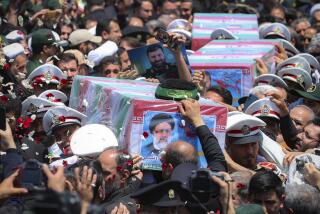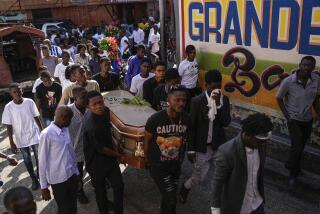Cambodians mourn King Norodom Sihanouk in lavish style
NEW DELHI -- Thousands of people lined the streets of Cambodia’s capital Friday for the funeral of King Norodom Sihanouk, a controversial monarch who helped build the young nation after French rule before cozying up to the homicidal Khmer Rouge regime.
Sihanouk’s embalmed body, which has been lying in state in Phnom Penh awaiting an auspicious date since his October death at age 89, was carried to the sounds of a 101-gun salute from the royal palace to an ornate funeral pyre in a city park specially constructed for the occasion.
The body’s half-mile trip aboard a giant golden float shaped like a mythological bird and accompanied by several chariots took three hours. Television images showed mourners -- a few in tears -- kneeling, praying, lighting candles and laying flowers as the procession passed along a route decorated with over-sized portraits of the king.
The body, accompanied by courtiers with pantaloons, spiked helmets and five-tiered umbrellas, is due to remain in the park until the cremation in a private ceremony on Monday, when the pyre will be lit by his son and wife.
This is the first royal funeral procession in Phnom Penh since 1960, with the death of Sihanouk’s father, King Suramarit, who was on the throne from 1955 until his death.
Sihanouk ruled both before and after his father. He was crowned by the French in 1941 at age 18 and developed into a wily political survivor. His formal rule lasted until his first abdication in 1955, although he remained influential until 1970, with another stint from as king from 1993 to 2004, when he passed the title on to his ex-ballet-dancer son Norodom Sihamoni and became known as “The King Father of Cambodia.”
He served twice as king, twice as sovereign prince, once as president and twice as prime minister in addition to various government-in-exile posts, earning him a spot in the Guinness Book of World Records as the politician holding the most political offices.
Sihanouk, the father of 14 children from six marriages, once reportedly said, “Cambodians are all naughty boys, and that includes me.” He was criticized for providing legitimacy to the Khmer Rouge and assisting its rise to power.
For years, the Khmer Rouge confined him to the palace and its policies, including forced migration and rampant genocide, would ultimately take over 1 million Cambodian lives, including five of Sihanouk’s children and 14 of his grandchildren. The genocide was the subject of a 1984 film, “The Killing Fields.”
Cambodians continued to hold great reverence for their colorful ex-king, who spoke several languages, composed music, played the clarinet, saxophone, piano and accordion and made several films documenting the country’s history.
Many of the films reflect an idealized view of Cambodia untouched by war and genocide, but it’s also important to look squarely at many of the excesses the country has endured, said Youk Chhang, head of Phnom Penh’s Cambodian Documentation Center, which maintains extensive archives on the Khmer Rouge period.
“No one can erase the history,” he said.
The lavish funeral ceremonies are taking place in a country struggling to forge a national identity, where one in five people still struggle in poverty.
“I, like many others, am a bit awed by the mass outpouring and cult-like public display of high emotions,” said Theary C. Seng, founding president of Phnom Penh’s Center for Cambodian Civic Education, a civic group. “The reaction now is one mainly of children missing their King Father, a father who never quite allowed his ‘children’ to develop and grow up.”
There’s been such an outpouring in part because Sihanouk, for all his faults, was one of the nation’s only constants through decades of civil war, turmoil and genocide, Seng said.
“It took his death to unite Cambodians together, but this moment of unity and reconciliation is fleeting and superficial.” she said. “I say farewell, not to a god-king, but to a man who loomed large in the imagination of Cambodians, for good or for ill. Farewell to an age and a personality.”
Sihanouk, who died of natural causes in Beijing following treatment for colon cancer, diabetes and hypertension, is seen by many Cambodians as a defender of the little people. In honor of the former king, 412 prisoners were pardoned, a new currency bill was issued and flags flew at half-staff. TV stations were told to shun “joyful” programming, and citizens were urged to wear black ribbons.
ALSO:
Suicide bomber kills 23 near Pakistan mosque
Egyptian liberals, Islamists join in denouncing violence
Somalia charges woman who said she was raped by troops
More to Read
Sign up for Essential California
The most important California stories and recommendations in your inbox every morning.
You may occasionally receive promotional content from the Los Angeles Times.










